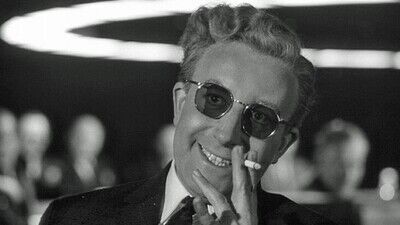
“Seven Days in May” was based on a 1962 novel by Fletcher Knebel and Charles W. Bailey II. It was the top bestseller on The New York Times list in November and December 1962, right after The Cuban Missile Crisis. The book and film are about an attempted U.S. military coup. In a screenplay by Rod Serling, U.S. president Jordan Lyman, played by Frederic March, signs a nuclear disarmament treaty with the USSR. Most voters disapprove of the agreement, leading to riots outside the White House. Dissent against Lyman builds within the halls of Congress and the upper echelons of the military. A Marine colonel named “Jiggs” Casey (Kirk Douglas) discovers that the Joint Chiefs of Staff, led by their chair James Scott (Burt Lancaster), are plotting a coup. They plan to kidnap Lyman and commandeer the country’s electronic communications systems. Casey alerts Lyman of the conspirators, and the president, though unsure of its veracity, assembles his closest confidants to look into the matter. The drama unfolds when the president cancels an appointment to participate in a scheduled military drill, which he suspects, based on Casey’s information, is a ruse to apprehend him.
President Kennedy had felt the cautionary message of “Seven Days in May” was so significant that he granted director John Frankenheimer a permit to film the riot scene on the Pennsylvania Avenue side of The White House. The movie premiered in D.C. on February 12, 1964. Edmond O’Brien earned an Oscar nomination for his role as longtime Georgia Senator Ray Clark (a play on President Johnson’s human sounding board in the U.S. Senate- Georgia’s Richard Russell)

“The Best Man,” directed by Franklin J. Schaffner, was adapted for the screen by Gore Vidal, based on his stage play. It was released on April 5, 1964. The movie depicts the backroom politics involved in major party presidential nominations and stars Henry Fonda, Cliff Robertson, and Lee Tracy. Fonda and Roberston are cast as rivals for their party’s presidential bid. Robertson, who had portrayed JFK in “Pt. 109” (the president had favored young Warren Beaty for the lead), plays a conservative senator concerned about the missile gap between the U.S. and USSR. Fonda’s character is a former Secretary of State in a failing marriage, in part due to his infidelity. At their party convention in L.A., they battle for the endorsement of a dying former president, played by Tracy (and based on Harry Truman). The ex-president doesn’t trust or like either candidate. Robertson’s character, Joe Cantwell, comes across some leaked psychological files about Fonda’s William Russell. The former president disapproves of the eleventh-hour smear tactic and supports Russell. Russell feels betrayed when he learns former President Hockstader has offered the vice presidency to three minor candidates. A Russell staffer informs Russell that Cantwell can be linked to a gay affair when he was serving in World War Two. The moral arc of the film turns on whether Russell will use this information to secure the nomination.
Real-world politicians knew about public fears of The Bomb. In mid-June 1964, John P. Roche, head of Americans for Democratic Action, a liberal lobbying group, encouraged President Johnson’s press secretary, Bill Moyers, to run attack ads against Goldwater. In that era, such ads were rare, and televised campaign ads focused on what the candidate being endorsed would do and stand for. The combination of Goldwater’s uncompromised stance on bombing Vietnam and persistent fears of nuclear war changed all that. On Labor Day 1964, at 9:50 p.m., during NBC’s broadcast of their “Monday Night Movie,” “David and Bathsheba,” a Democratic concern aired a Johnson campaign spot that came to be known as “Daisy Girl.” In the ad, produced by the agency Doyle Dane Bernbach, a toddler girl plucks petals from a daisy while counting down from ten to one, with a backdrop of an ominous male voiceover counting down to the detonation of a hydrogen bomb. The only other dialogue in the commercial was the concluding “Vote for Lyndon Johnson on November 7th”. The ad only aired once.

